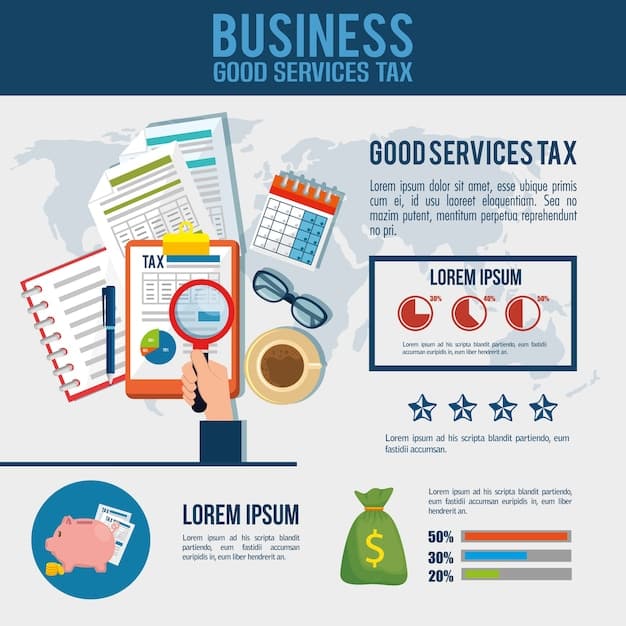Breaking: New Tax Law 2025 – Understand the Impact on Your Taxes

Breaking: New Tax Law Takes Effect January 1, 2025 – How Will It Impact Your Taxes? This new law brings significant changes to various aspects of the tax code, potentially affecting individual taxpayers, businesses, and investments. Understanding these changes is crucial for effective tax planning.
The tax landscape is constantly evolving, and keeping up with the changes is essential for anyone who wants to manage their finances effectively. Breaking: New Tax Law Takes Effect January 1, 2025 – How Will It Impact Your Taxes? This is the question on many taxpayers’ minds as we approach the new year. The implications of this new legislation could reach far and wide, impacting everything from individual tax returns to corporate tax strategies.
Are you prepared to adapt to the upcoming changes? This article will break down the key components of the new law, explore its potential consequences, and provide insights to help you navigate the new tax environment. Let’s dive in and understand Breaking: New Tax Law Takes Effect January 1, 2025 – How Will It Impact Your Taxes?
Understanding the Key Changes in the New Tax Law
The new tax law is a comprehensive piece of legislation that introduces changes to various aspects of the tax code. It’s important to understand these changes to accurately assess how they will affect your individual or business taxes.
Individual Income Tax Changes
Several changes impact individual income tax, including adjustments to tax brackets, deductions, and credits. Here’s a breakdown:
- Tax Bracket Adjustments: The income thresholds for each tax bracket may be adjusted to account for inflation or other economic factors.
- Standard Deduction Changes: The standard deduction amount may increase or decrease, affecting the number of people who choose to itemize deductions.
- Changes to Tax Credits: Certain tax credits, such as the Child Tax Credit or Earned Income Tax Credit, may be modified, impacting eligibility and credit amounts.
These changes to individual income tax could significantly alter how much individuals owe in taxes or receive as refunds. Monitoring these changes is critical for effective tax planning.
Business Tax Changes
Businesses also face changes under the new tax law. Here are some key areas to consider:
- Corporate Tax Rate: The corporate tax rate may change, affecting the overall tax burden for corporations.
- Deduction Limitations: Deductions for certain expenses, such as executive compensation or meals, may be limited or eliminated.
- Changes to Depreciation Rules: Rules regarding depreciation of assets may be revised, impacting businesses’ ability to deduct the cost of assets over time.
Businesses must understand these changes to accurately calculate their tax liabilities and make informed decisions about investments and operations.
In conclusion, the changes introduced by the new tax law require careful attention and analysis to understand their impact on both individuals and businesses. Keeping informed about these changes is key to navigating the new tax landscape effectively. The essence of Breaking: New Tax Law Takes Effect January 1, 2025 – How Will It Impact Your Taxes? lies in these adjustments and it’s something that needs to be understood properly.
How the New Law Affects Different Income Levels
The impact of the new tax law varies depending on income level, with different groups experiencing different effects. Understanding these disparities is essential for tailoring tax strategies.
Low-Income Households
Low-income households may see a reduction in their tax burden due to changes in tax credits or deductions. The Earned Income Tax Credit, for example, could be expanded, providing additional relief. The new modifications as a result of understanding Breaking: New Tax Law Takes Effect January 1, 2025 – How Will It Impact Your Taxes? may include:
- Increased Earned Income Tax Credit: Eligibility criteria and credit amounts may be adjusted to benefit low-income earners.
- Expanded Child Tax Credit: The Child Tax Credit may be modified to provide greater assistance to families with children.
- Increased Standard Deduction: An increase in the standard deduction could reduce taxable income for low-income households.
These changes could provide much-needed financial relief for low-income households, helping them make ends meet.
Middle-Income Households
Middle-income households may experience a mix of benefits and drawbacks under the new tax law. Changes to tax brackets and deductions could have varying effects:
Tax Bracket Adjustments: Depending on their income level and filing status, middle-income households may fall into different tax brackets, affecting their overall tax liability.
- Changes to Itemized Deductions: Limitations on itemized deductions, such as state and local taxes, could impact middle-income households who typically itemize.
- Modified Tax Credits: Tax credits for education, homeownership, or other expenses may be adjusted, affecting eligibility and credit amounts.
Middle-income households should carefully review the new tax law and adjust their financial strategies accordingly.
High-Income Households
High-income households may face higher tax rates or limitations on deductions under the new tax law. The changes can impact their investment and income strategies:
- Increased Tax Rates: Higher income tax rates may be implemented for high-income earners.
- Limitations on Deductions: Deductions for investment expenses, charitable contributions, or other items may be limited.
- Changes to Capital Gains Taxes: Capital gains tax rates may be adjusted, affecting the taxation of investment profits.
High-income households should consult with tax professionals to develop strategies for minimizing their tax liabilities and managing their investments effectively. They need to understand Breaking: New Tax Law Takes Effect January 1, 2025 – How Will It Impact Your Taxes? to strategize efficiently.
In summary, the new tax law has different effects on different income levels, with low-income households potentially seeing increased benefits, middle-income households experiencing a mix of effects, and high-income households potentially facing higher taxes. Understanding these disparities is crucial for effective tax planning.
Strategies for Adapting to the New Tax Law
Adapting to the new tax law requires proactive planning and strategic adjustments to your financial affairs. Here are some strategies for navigating the new tax environment effectively:
Review Your Tax Situation
Start by reviewing your current tax situation and assessing how the changes in the new tax law will affect you. Consider factors such as your income level, filing status, deductions, and credits.
Tax situation evaluation enables you to effectively strategize the implications of Breaking: New Tax Law Takes Effect January 1, 2025 – How Will It Impact Your Taxes? to you and or your business.
- Gather relevant financial documents, such as W-2s, 1099s, and receipts.
- Use tax software or consult with a tax professional to estimate your tax liability under the new law.
- Identify areas where you may be negatively impacted and explore potential strategies for mitigating those effects.
Adjust Your Withholding
If the new tax law significantly changes your tax liability, consider adjusting your withholding to avoid owing money or receiving a large refund at tax time.
You need to stay informed about Breaking: New Tax Law Takes Effect January 1, 2025 – How Will It Impact Your Taxes? to be able to adjust your withholding if necessary.
- Use the IRS’s withholding calculator to estimate your tax liability and determine the appropriate withholding amount.
- Submit a new Form W-4 to your employer to adjust your withholding.
- Review your withholding periodically to ensure that it aligns with your income and tax situation.
Consider Tax-Advantaged Investments
Take advantage of tax-advantaged investment options, such as 401(k)s, IRAs, and HSAs, to reduce your taxable income and potentially lower your tax bill.
- Contribute to a 401(k) or traditional IRA to defer taxes on your retirement savings.
- Contribute to a Roth IRA to enjoy tax-free withdrawals in retirement.
- Contribute to a Health Savings Account (HSA) to save for healthcare expenses on a tax-advantaged basis.
Optimize Deductions and Credits
Explore all available deductions and credits to minimize your taxable income and reduce your tax liability. Evaluate what aspects of Breaking: New Tax Law Takes Effect January 1, 2025 – How Will It Impact Your Taxes?, you can use to your advantage and strategize your expenses.

- Itemize deductions if your itemized deductions exceed the standard deduction amount.
- Take advantage of tax credits for education, childcare, energy efficiency, and other expenses.
- Keep accurate records of all deductible expenses and credits.
Effective strategies for adapting to the new tax law involve proactive planning, strategic adjustments to your financial affairs, and careful attention to deductions and credits. By taking these steps, you can navigate the new tax environment effectively and minimize your tax liability.
The Impact on Small Businesses
Small businesses face unique challenges and opportunities under the new tax law. Understanding the specific implications for small businesses is crucial for success.
Pass-Through Deduction
The pass-through deduction, also known as the qualified business income (QBI) deduction, allows eligible self-employed individuals and small business owners to deduct up to 20% of their qualified business income. Here’s what you should know:
- Eligibility requirements for the pass-through deduction may be modified under the new tax law.
- Limitations on the deduction may apply based on income level and business type.
- Small business owners should carefully review the rules and regulations to ensure they qualify for the deduction.
Depreciation and Expensing
Changes to depreciation rules and expensing options can significantly impact small businesses’ ability to deduct the cost of assets. You may want to evaluate the Breaking: New Tax Law Takes Effect January 1, 2025 – How Will It Impact Your Taxes? related to deprecation and expensing.
- The new tax law may include changes to bonus depreciation rules, allowing businesses to deduct a larger percentage of the cost of assets in the first year.
- Section 179 expensing limits may be increased, allowing small businesses to deduct the full cost of qualifying property up to a certain limit.
- Small businesses should review the new depreciation rules and expensing options to optimize their tax savings.
The new tax law may include changes to bonus depreciation rules, allowing businesses to deduct a larger percentage of the cost of assets in the first year.
Business Tax Credits
Small businesses may be eligible for various tax credits, such as the research and development (R&D) tax credit, the work opportunity tax credit (WOTC), and the small business health insurance tax credit. Here’s what to consider:
- The new tax law may modify the eligibility requirements or credit amounts for these tax credits.
- Small businesses should explore all available tax credits to reduce their tax liability and support business growth.
- Careful planning and documentation are essential for claiming these tax credits.
The new tax law presents both challenges and opportunities for small businesses. They need to be in the know about Breaking: New Tax Law Takes Effect January 1, 2025 – How Will It Impact Your Taxes? By understanding the specific implications of the new law and taking advantage of available deductions and credits, small businesses can navigate the tax landscape effectively and thrive.
Seeking Professional Advice
Given the complexity of the new tax law, seeking professional advice from a qualified tax professional can be invaluable. Here’s why:
Expert Guidance
Tax professionals have in-depth knowledge of the tax code and can provide expert guidance tailored to your specific financial situation. They are well versed about Breaking: New Tax Law Takes Effect January 1, 2025 – How Will It Impact Your Taxes?
- Tax professionals can help you understand the implications of the new tax law for your individual or business taxes.
- They can identify potential tax savings opportunities that you may overlook.
- They can assist with tax planning, compliance, and representation before the IRS.
Personalized Strategies
Tax professionals can develop personalized strategies to minimize your tax liability and optimize your financial outcomes. This is especially important to strategize regarding what they know about Breaking: New Tax Law Takes Effect January 1, 2025 – How Will It Impact Your Taxes?
- They can analyze your financial situation and recommend strategies for reducing your taxable income.
- They can help you make informed decisions about investments, retirement planning, and other financial matters.
- They can provide ongoing support and guidance to help you stay on track with your tax goals.
Peace of Mind
Working with a tax professional can provide peace of mind knowing that your taxes are being handled correctly and efficiently.
- You can rest assured that your tax returns are accurate and compliant with all applicable laws and regulations.
- You can avoid costly errors and penalties by relying on the expertise of a qualified tax professional.
- You can focus on your personal or business goals without worrying about IRS audits or compliance issues.
Seeking professional advice is a wise investment that can pay dividends in the form of tax savings, peace of mind, and financial security. Especially with such a major impact from Breaking: New Tax Law Takes Effect January 1, 2025 – How Will It Impact Your Taxes?
| Key Point | Brief Description |
|---|---|
| ✅ Tax Bracket Adjustments | Income thresholds for tax brackets may change, impacting your tax liability. |
| 🏢 Business Tax Changes | Corporate tax rates, deduction limitations, and depreciation rules may be revised. |
| 💰 Adapting Strategies | Review your tax situation, adjust withholding, and optimize deductions & credits. |
| 💼 Small Business Impact | Pass-through deduction, depreciation, and business tax credits may be affected. |
Frequently Asked Questions
The new tax law may impact individual taxpayers through adjustments to tax brackets, standard deductions, and tax credits. It’s essential to review your financial situation to understand how these changes will affect you.
Businesses may experience changes in corporate tax rates, deduction limitations, and depreciation rules under the new tax law. It’s crucial to assess the impact of these changes on your business operations.
Strategies for adapting to the new tax law include reviewing your tax situation, adjusting your withholding, considering tax-advantaged investments, and optimizing deductions and credits.
Small businesses may be affected by changes to the pass-through deduction, depreciation rules, and business tax credits. Understanding these changes is vital for effective tax planning.
Seeking advice from a qualified tax professional is highly recommended. They can provide expert guidance, personalized strategies, and peace of mind as you navigate the new tax landscape and understand the new tax implications.
Conclusion
In conclusion, the Breaking: New Tax Law Takes Effect January 1, 2025 – How Will It Impact Your Taxes? presents both challenges and opportunities for individuals and businesses and these should be taken seriously. By staying informed, proactively adapting your financial strategies, and seeking professional advice when needed, you can navigate the new tax environment effectively and achieve your financial goals.
Remember that tax laws are complex and subject to change, so continuous learning and adaptation are essential for success. Be sure to revisit this article as needed, and consult with qualified professionals for personalized tax advice.





